It's weird that Mass Effect 3 was the game that really made loot boxes mainstream
Looking back at how ME3's surprisingly fun multiplayer helped popularize the worst monetization gimmick of the 2010s.
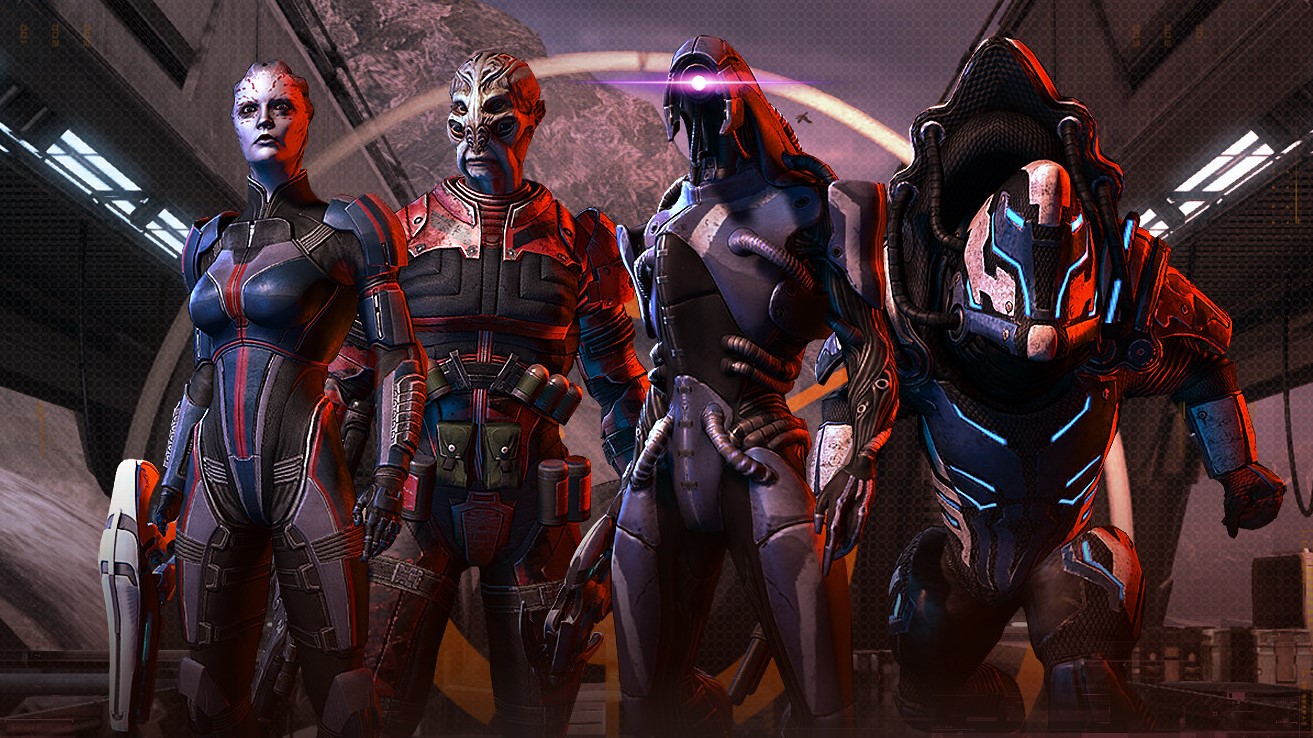
Mass Effect 3 came out in 2012, right around the peak of big game publishers like EA full-on panicking about used game sales and the absolute necessity of every singleplayer game shipping with a multiplayer mode. Why else would someone buy a game for full-price on release day—to sit there and play it, alone, just to enjoy a story? It was the 2010s, and surely no one wanted that anymore. Out of that publisher fear we got some truly bizarre multiplayer modes alongside singleplayer games: modes like 'capture the little sister' in BioShock 2, and Mass Effect 3's co-op, which you could play to up your "galactic readiness" for the campaign's big finale.
Mass Effect 3's multiplayer was, in concept, a transparent attempt to stretch out the game's campaign and to milk players for more money after they slapped down their $60. It was also, against all odds, really good.
No one I know was looking forward to the multiplayer mode before release. But Mass Effect 3's shooting was a big step forward, and it wisely stuck to co-op over PvP, recreating the fun team combinations you'd have with your AI squad in singleplayer in a mode you could play with friends. It was probably the best tacked-on multiplayer mode of the era, and it's surreal to look back on it now as ground zero for the most-hated game monetization gimmick of the decade.
Loot age: Origins
People weren't mad about loot boxes in 2012. We didn't even call them loot boxes at the time. I played Magic the Gathering in the early 2000s, but Mass Effect 3 was the first videogame I played that took the concept of card packs and stuffed it into something that was otherwise familiar. ME3's card packs took all the weapons and character customization from the campaign and doled them out at random, making it genuinely exciting to unlock an Asari adept or a Krogan soldier.
But look at some of the unlocks in ME3 and you'll see early hints of the ugliness from later loot systems.
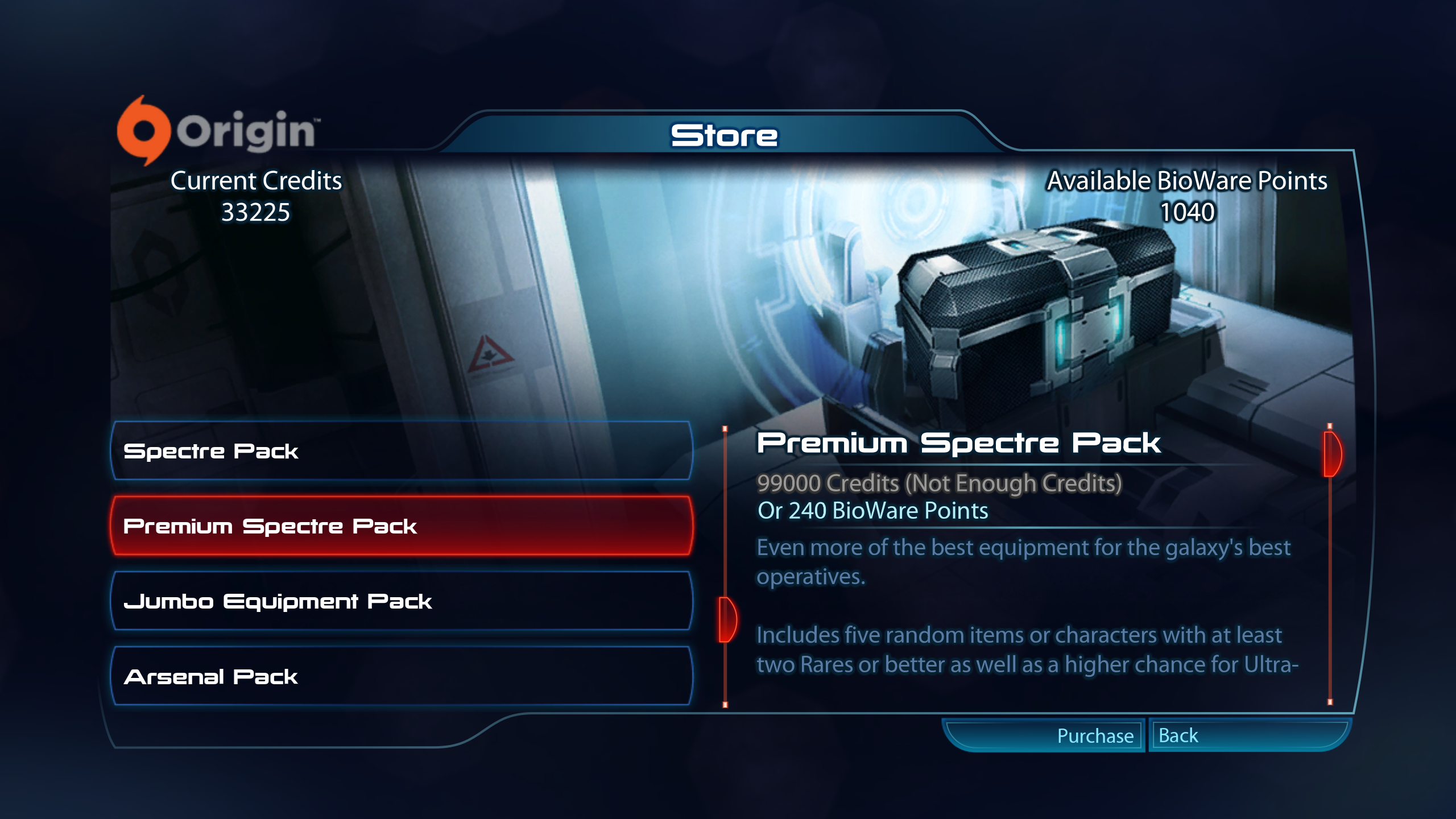
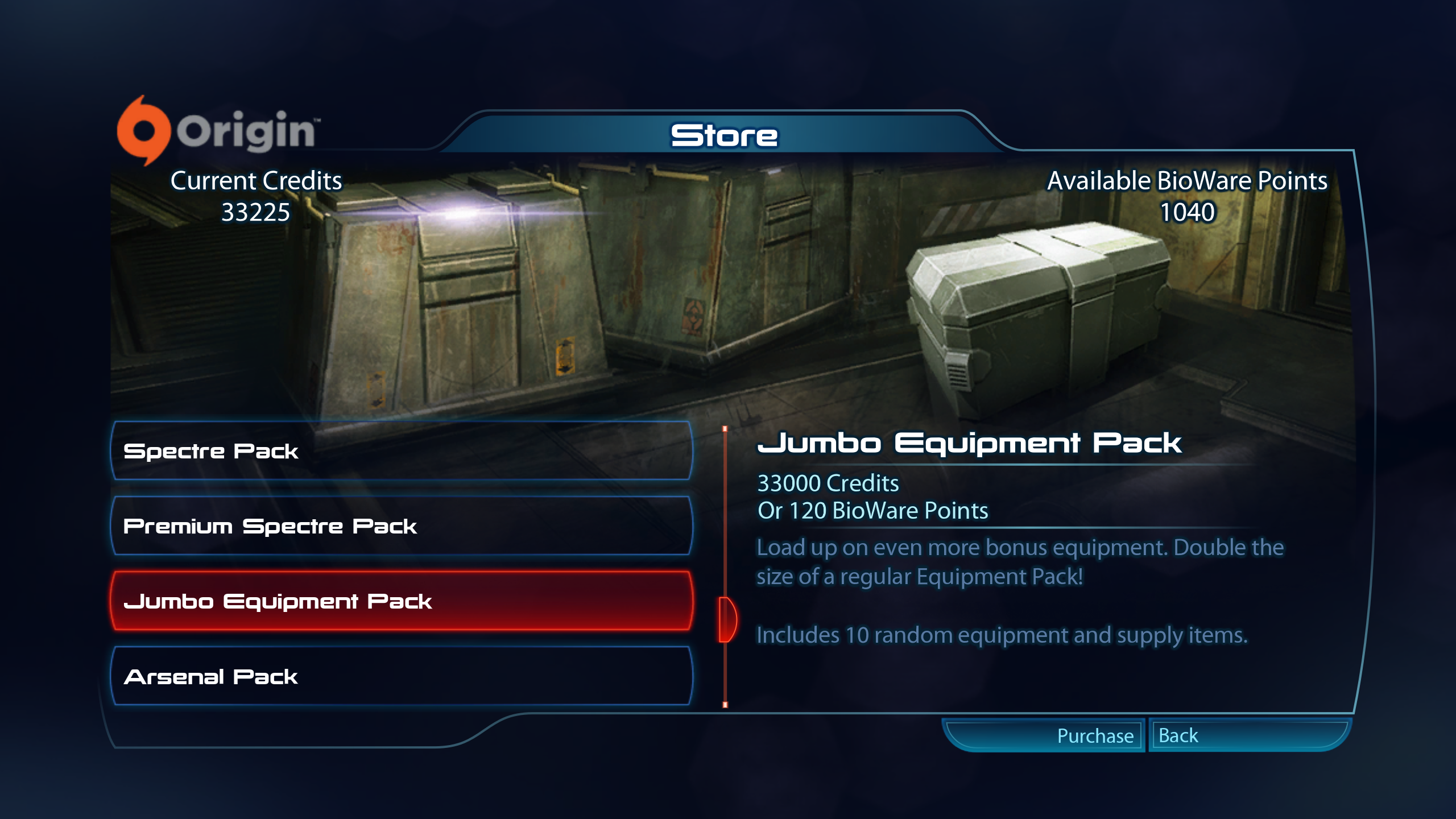
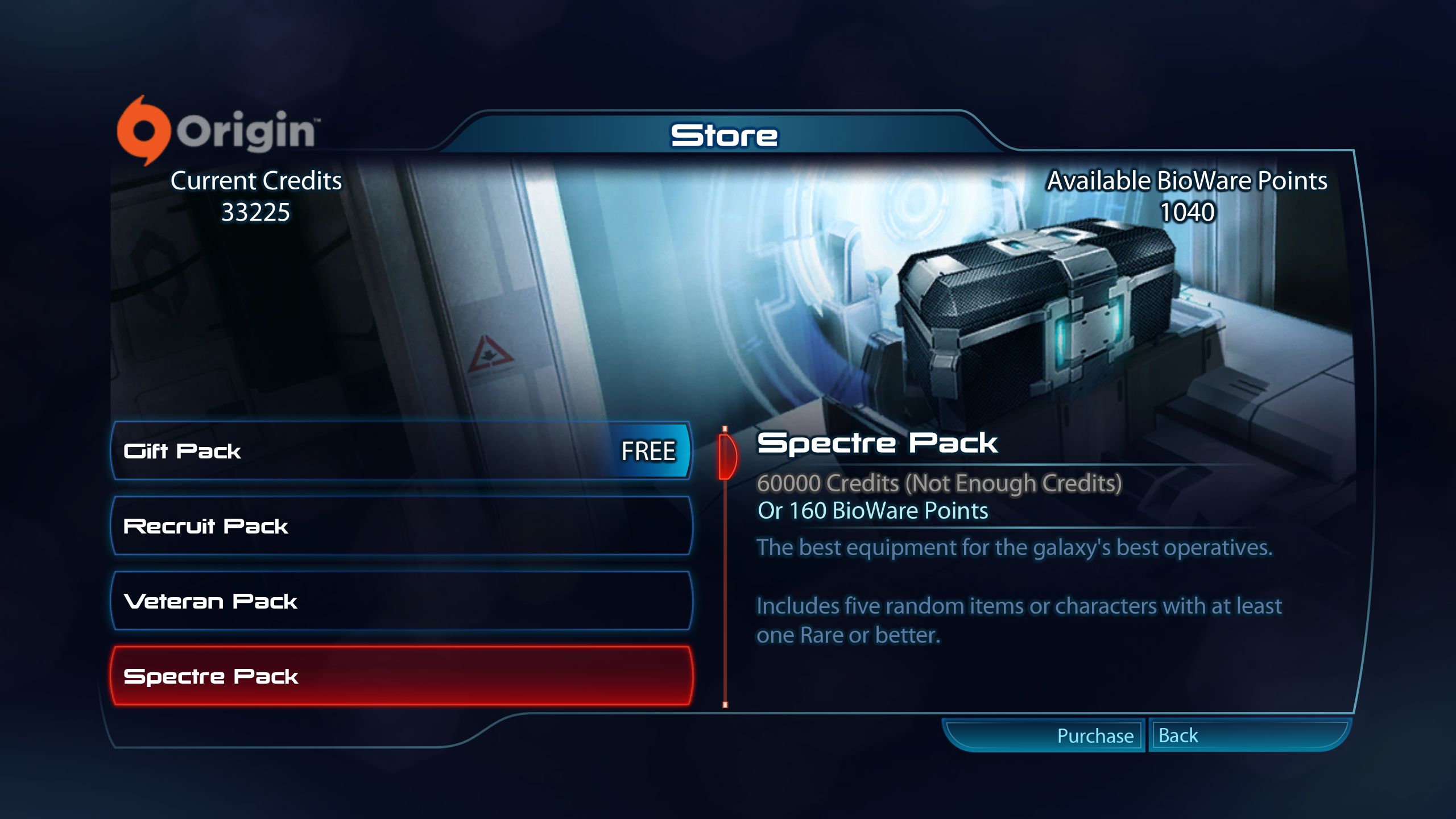
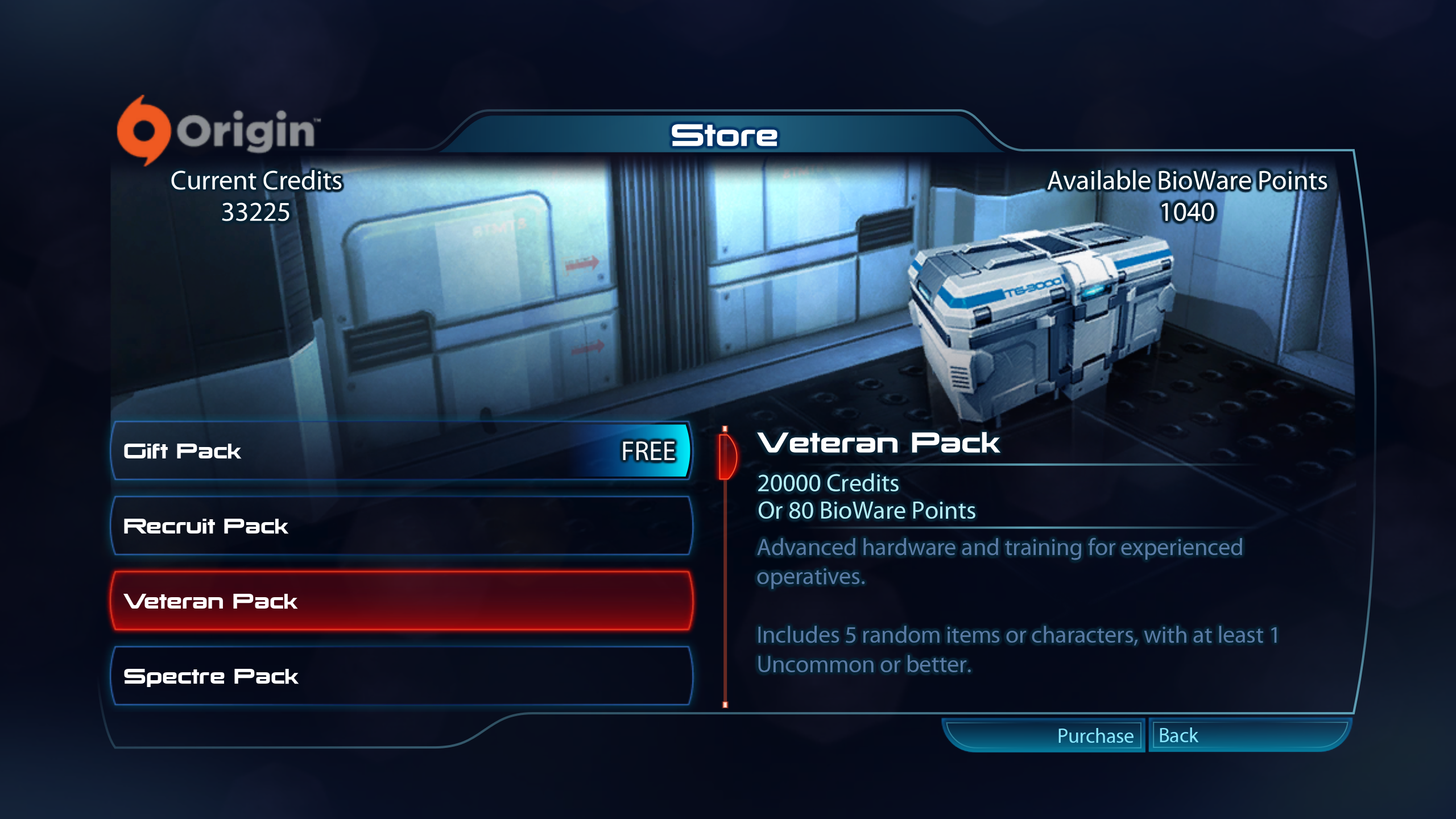
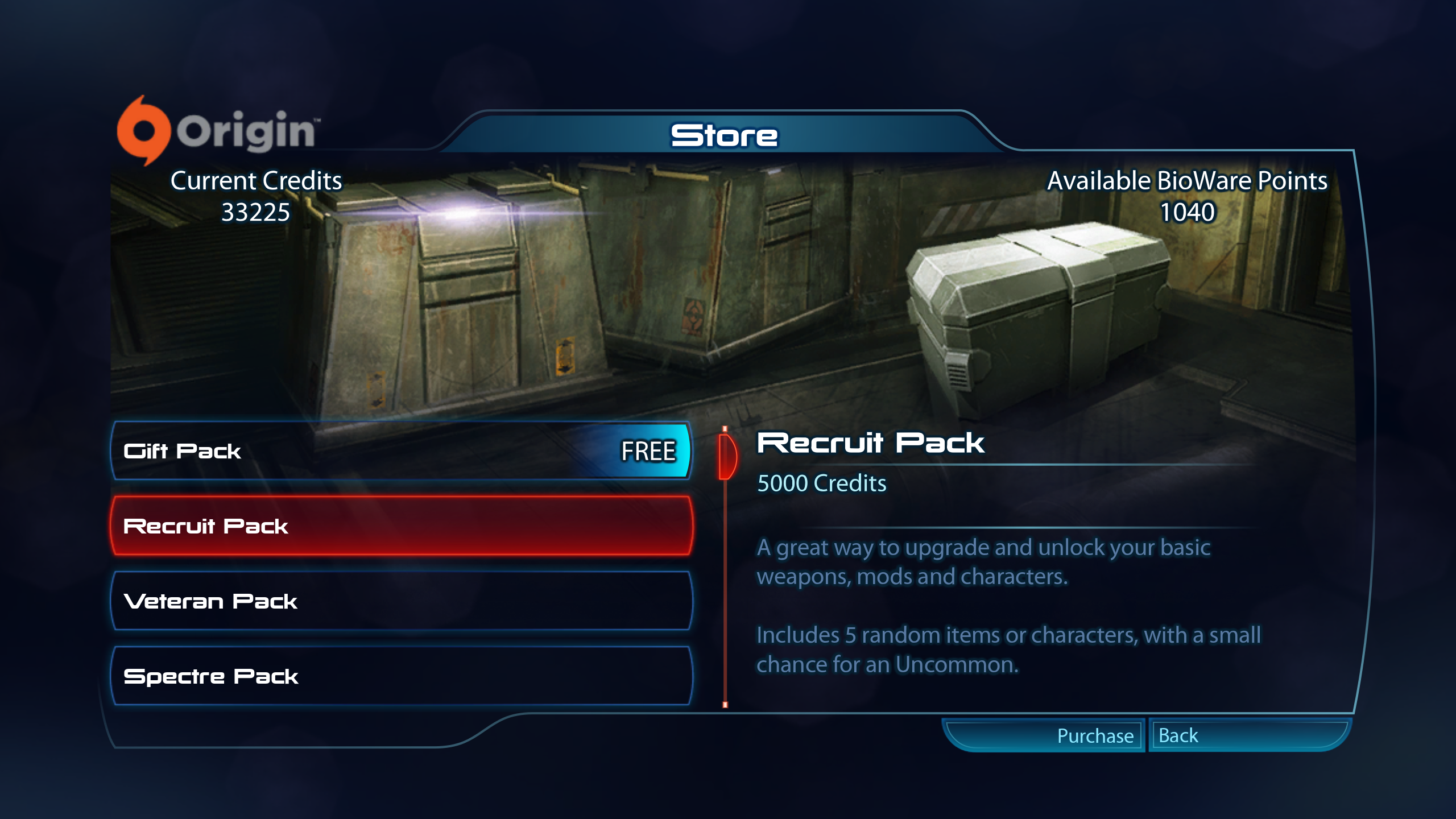
- Almost all character unlocks were rares, and many stronger weapons were rares or ultra-rares, which had low drop rates (7.5% for ultra-rares, and only in the more expensive packs).
- The cheapest pack to guarantee at least one rare was the Spectre pack: 60,000 credits or 160 BioWare points ($1.99)
- The Reserves pack, the best way to unlock characters including two guaranteed rares, cost 99,000 credits or 240 BioWare points ($2.99)
- Equipment and supply items were single-use consumables like medi-gel and incendiary rounds. You could get them out of cheaper loot packs but always needed them on-hand for missions, meaning you often needed to buy those loot packs instead of saving up for pricier ones with rarer drops.
A perfect score on the Bronze or Silver difficulty levels would net you 17,300 or 34,375 credits, so you could at least earn the points to unlock card packs pretty quickly. For players like me, who stuck around the multiplayer a month or two after launch, nothing about the card packs felt insidious. The randomness could be fun! For players who got hooked, though, you can see how these loot boxes could've pushed them to spend. Significant unlocks like characters and weapons were on the line, not just cosmetics.
Obsessive players figured out you essentially needed to fill your inventory with those disposable supply cards (255 of each item!) and unlock all the commons and uncommons to have better odds at the rarer loot. They collected data to estimate that you'd have to open, on average, 738 card packs to get every ultra-rare, which would cost 73,062,000 credits or $2,214.
The biggest gaming news, reviews and hardware deals
Keep up to date with the most important stories and the best deals, as picked by the PC Gamer team.
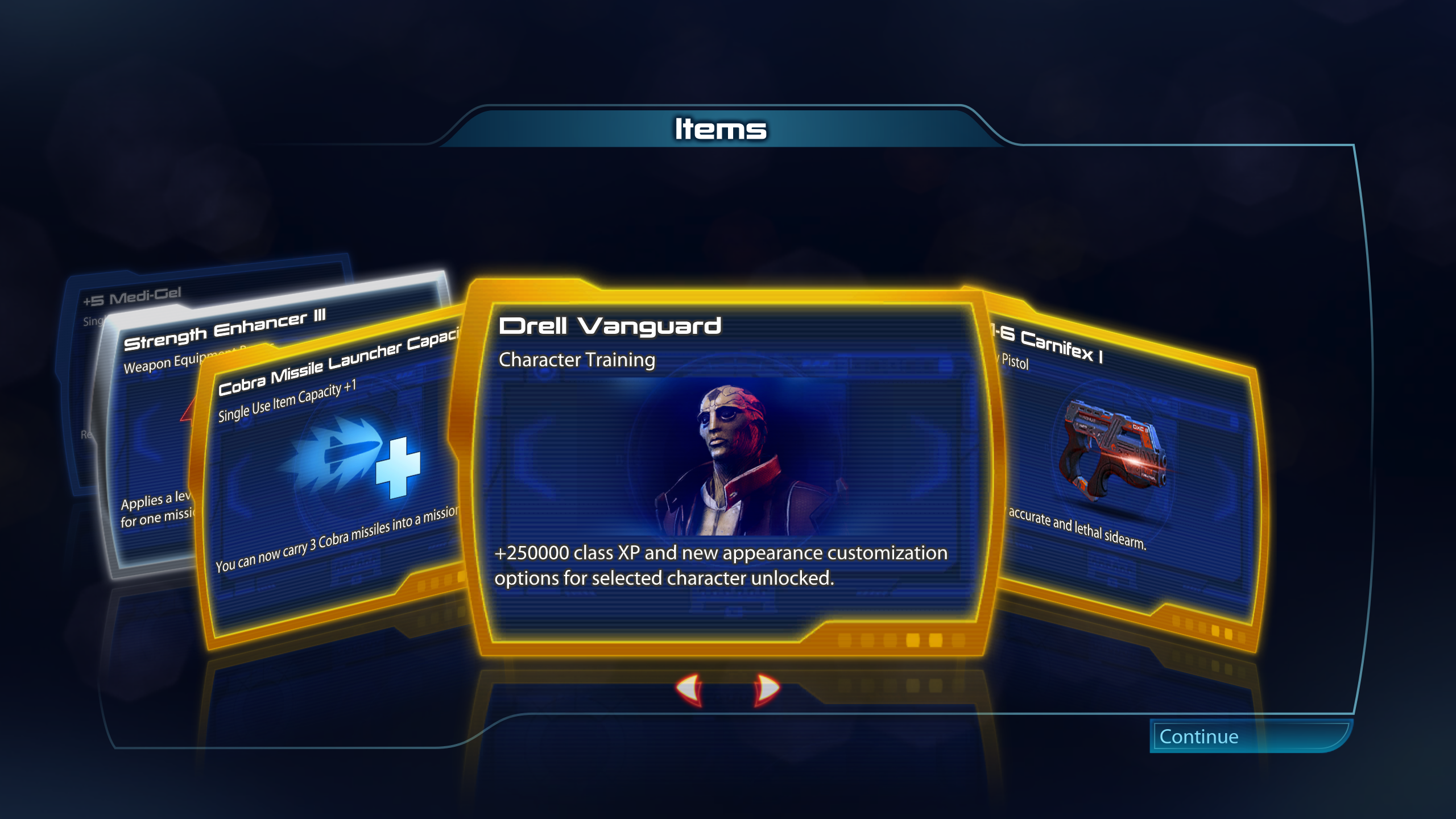
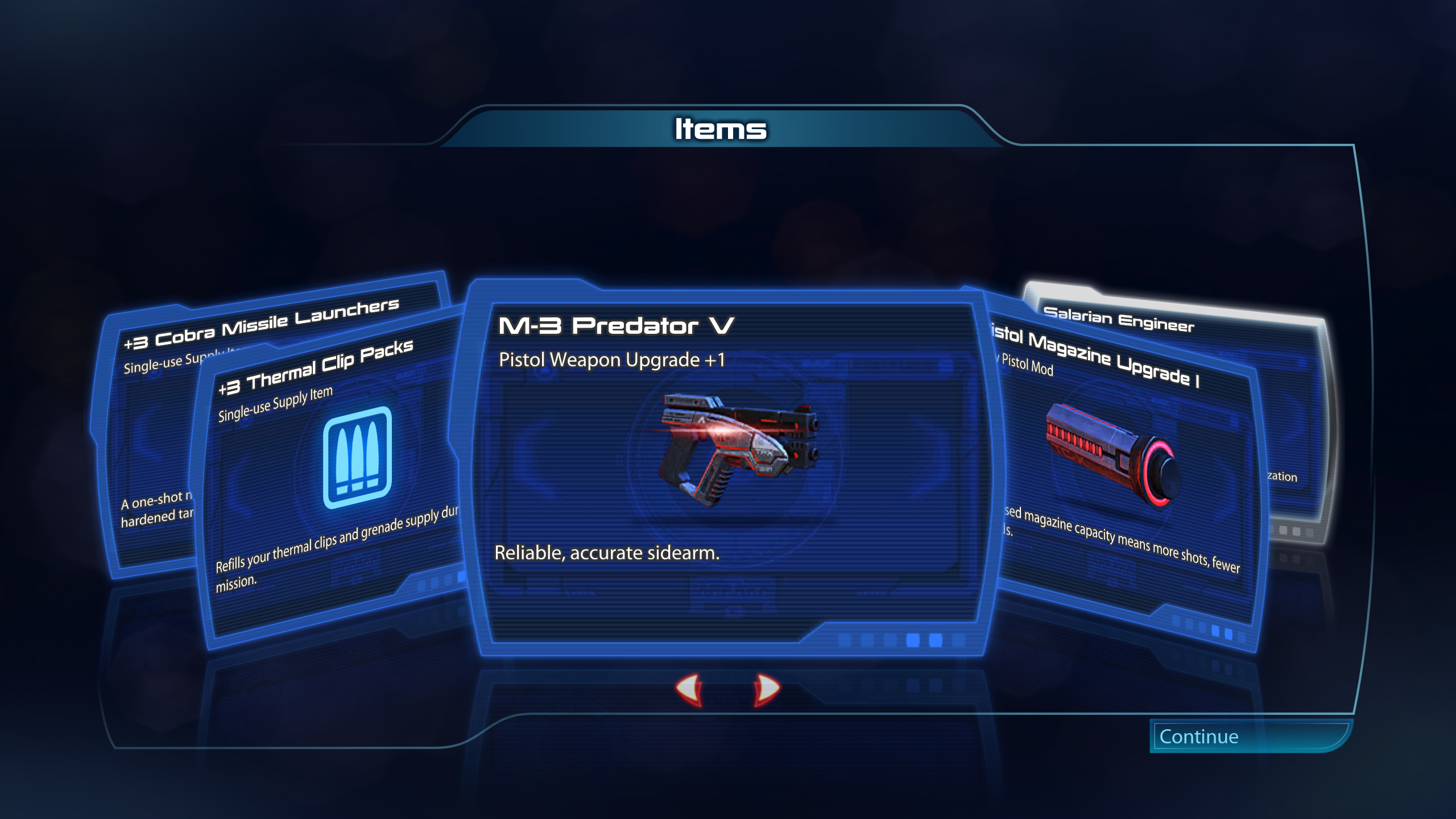
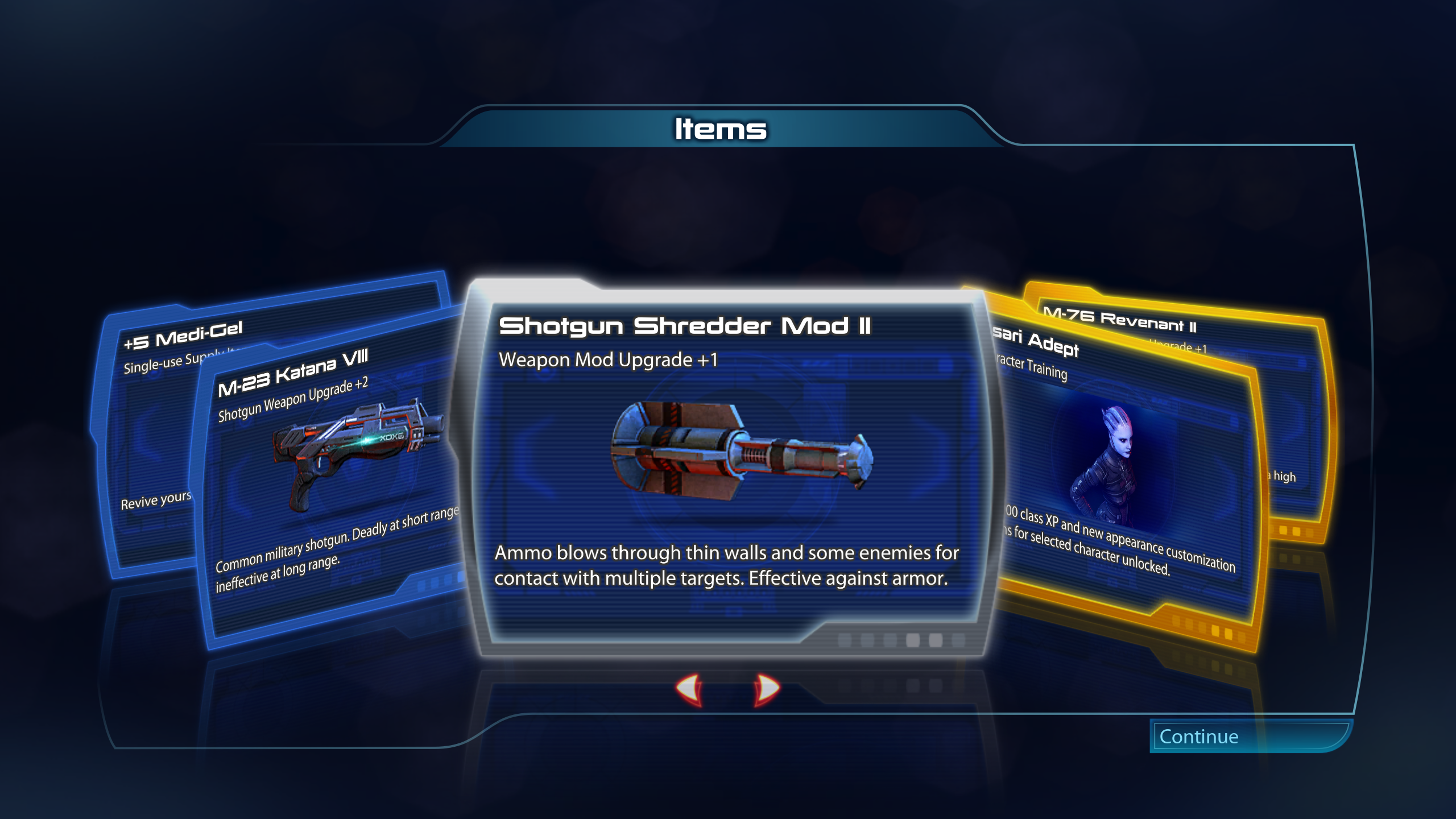
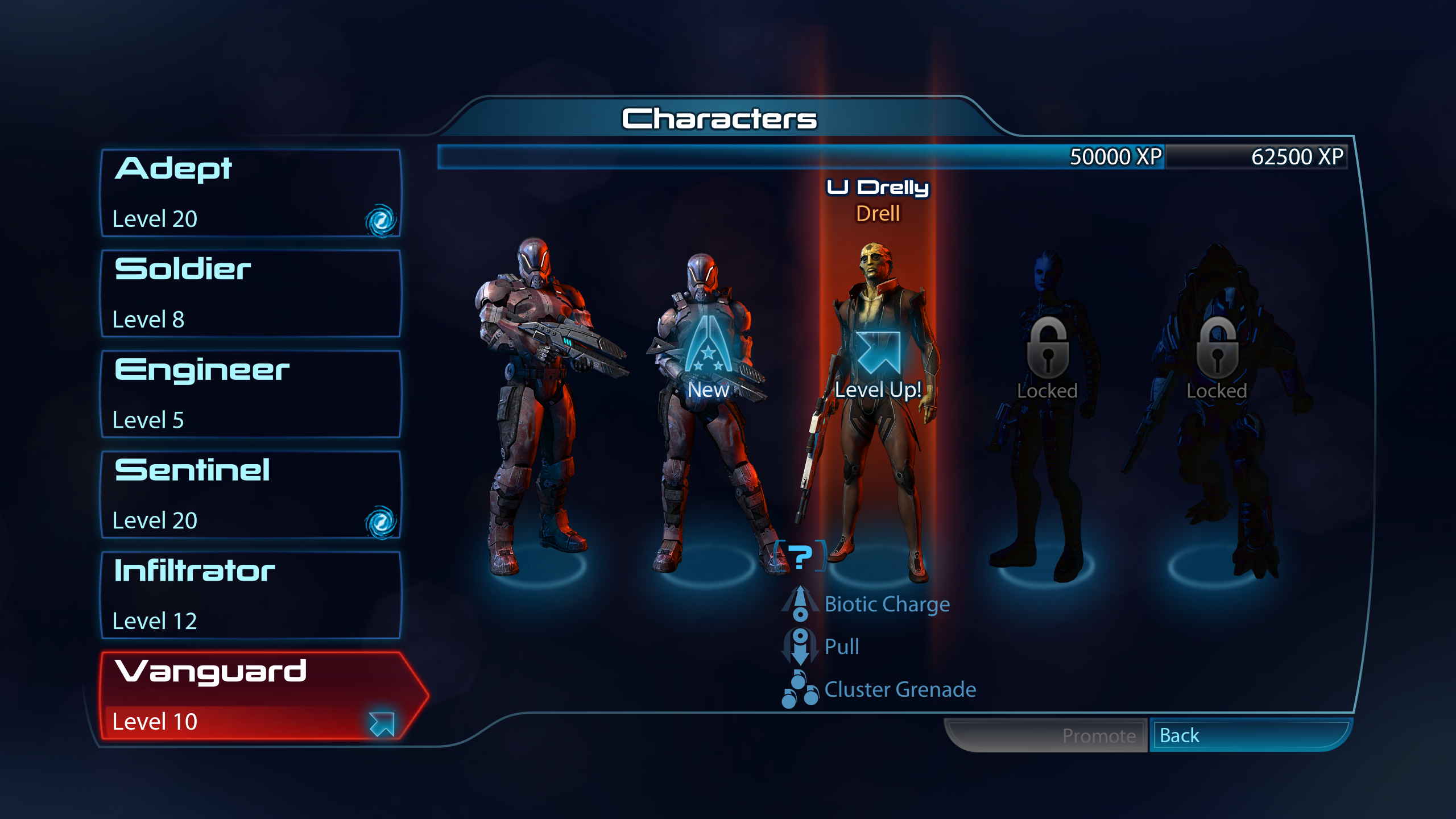
If you didn't want to spend any money, you could earn those credits by playing about 236 hours of Gold matches (or a mere 161 hours if you had the skills and gear to play on Platinum).
None of this was part of the conversation back in 2012. Looking back at the r/MassEffect subreddit circa spring 2012 via the Internet Archive, I didn't even see a mention of the card packs—everyone was too focused on the ending. That was controversial. Mass Effect 3's perfectly acceptable multiplayer, meanwhile, must have appeared as proof to EA that the loot boxes pioneered in the FIFA games could be lucrative in other games, too. And in the future, they wouldn't just be co-op.
Loot boxes: Legendary edition
In the years after Mass Effect 3, EA started putting different versions of those card packs into more of its big games. Battlefield 4 Battlepacks contained things like skins (not so bad) and weapon attachments (not so good). After launch, EA added shortcut kits to skip the unlock process—pay $7, for example, to unlock all the upgrades for the support class "to catch you up with Battlefield 4 veterans." Games have been offering shortcuts and XP boosts since long before loot boxes became controversial, but I'll always be skeptical of how well-balanced an unlock system is when the game will also sell you a way to bypass it completely. We didn't love it when Ubisoft added XP boosts to the Assassin's Creed series, either.
More EA games followed:
- Every annual FIFA and Madden game continued to include the card pack-based Ultimate Team mode
- Battlefield Hardline in 2015
- Battlefield 1 in 2016 (though, thankfully, BF1 removed weapon attachments from battlepacks)
- Mass Effect: Andromeda in 2017
- Need for Speed Payback in 2017, which PC World writer Hayden Dingman said was "the first full-price game to be irredeemably ruined by loot boxes." He also said "It probably won't be the last." Star Wars: Battlefront 2 was released 7 days later.
- Battlefront 2 in 2017, the game that turned loot boxes into an international controversy, triggering government inquiries, lawsuits, and the most-downvoted post in Reddit history
EA was hardly alone: Loot boxes made their way into tons of games. Call of Duty, Assassin's Creed, Halo and Forza and Gears of War, and, of course, Overwatch.
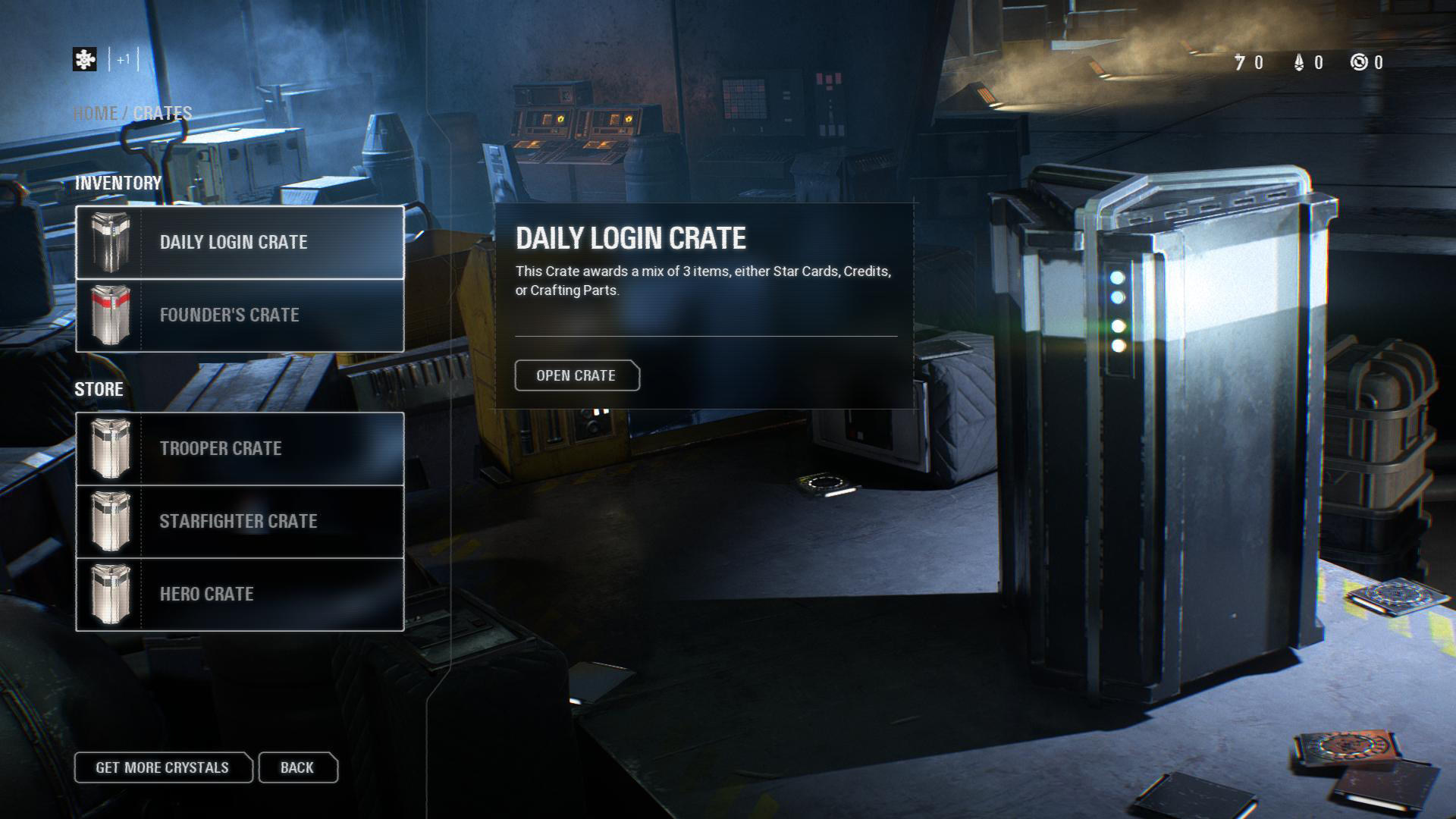
Star Wars: Battlefront 2 was the flashpoint for anger over loot boxes, and many players began calling loot box systems gambling. If you look at Battlefront 2's loot boxes (before EA toned them down after the backlash) next to Mass Effect 3's loot boxes, it doesn't feel like a whole lot changed between them. The key items in Battlefront 2 were Star Cards, which you equipped to different character classes to change their weapons or get a passive stat boost, like more health. They were essentially the same as unlocking better weapons in ME3 multiplayer. And just like in ME3, they had rarity values attached to them. Battlefront 2's system was more convoluted, though, and it was a bigger game, meaning you would frequently be getting Star Cards for one of the many characters you didn't actually want to play.
The big difference, of course, was that Battlefront 2 was PvP. Players looked at how annoying it was to acquire upgrades through the random loot system, then looked at the fact you could buy those same loot boxes with real money (just like in ME3), and decided it was a pay-to-win system. It wasn't fun. It felt exploitative. And when Redditors did the math on how long it would take to unlock Battlefront 2's hero characters, the official response to that thread just poured fuel on the fire (it's the one that became the most-downvoted post in Reddit history).
The attention got governments involved, though most have since decided that loot boxes should not be classified as gambling. Regardless, loot boxes were tainted. In the years since Battlefield 2, many publishers have removed them from their games or at least limited them to cosmetic items.
Loot boxes are hardly gone—they're still a major mechanic in sports games like FIFA, many mobile games, and other free-to-play games—but they've become scarce in full-price PC and console games. New lawsuits continue to pop up from time to time, like this one aimed at EA in 2020.
If Mass Effect Legendary Edition had released with its multiplayer mode intact, its card packs would probably cause far more discussion than they did in 2012. What was once an exciting unlock mechanic now looks cynical and exploitative in a game you pay $60 for, even if it is co-op only.
For now, free-to-play games still get away with gacha systems, which are all about gambling for the drops you want, just like loot boxes. And practically all of them have battle passes, which incentivize players to log in daily and play as much as they can to avoid missing out on any of the goodies dangled in front of them. Both systems are in some of the biggest games today and earn billions of dollars. But as Mass Effect 3 and Battlefront 2 show, what's popular now may not fly in just a few years.
- Mass Effect guide: Everything to know
- Mass Effect romance: All available characters
- Mass Effect ending: How to keep everyone alive

Wes has been covering games and hardware for more than 10 years, first at tech sites like The Wirecutter and Tested before joining the PC Gamer team in 2014. Wes plays a little bit of everything, but he'll always jump at the chance to cover emulation and Japanese games.
When he's not obsessively optimizing and re-optimizing a tangle of conveyor belts in Satisfactory (it's really becoming a problem), he's probably playing a 20-year-old Final Fantasy or some opaque ASCII roguelike. With a focus on writing and editing features, he seeks out personal stories and in-depth histories from the corners of PC gaming and its niche communities. 50% pizza by volume (deep dish, to be specific).

